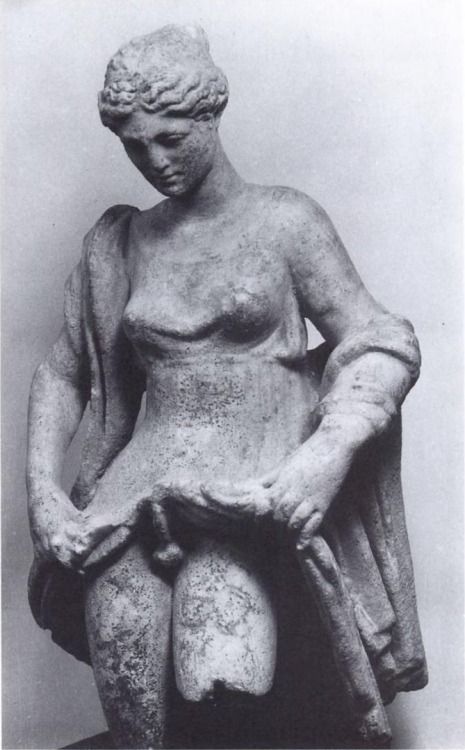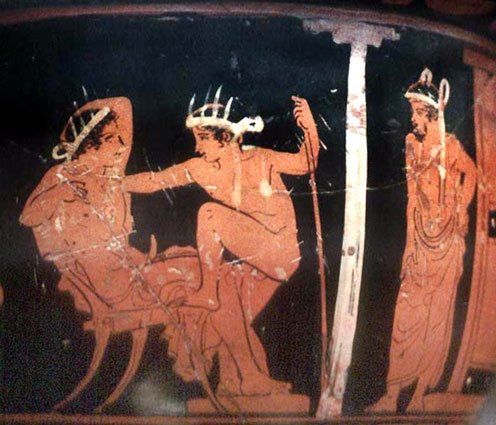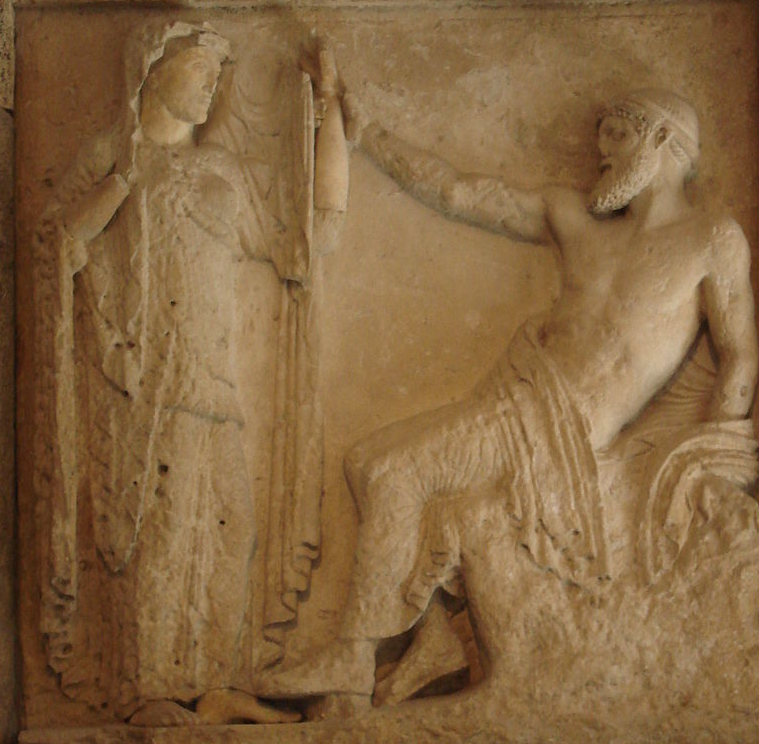Sex Change in Greek Mythology

There are several stories about sex change in Greek mythology, both of mortals being changed by the gods and of gods transforming themselves at will. Find out about the stories that have survived to the present day ‒ even if just as a throwaway line in another story.
Kainis / Caenis
Kainis was a princess of the Lapithai tribe of Thessalia in Northern Greece. As Ovid tells it, Kainis ‒ or Caenis, as the Latin spelling goes ‒ was remarkable for her charm, the most beautiful of all Thessalian maidens. Caenis never became the willing bride of any suitor, but while she was walking on a lonely shore, the god of the ocean saw and ravished her. Pleased with his conquest, Neptune-Poseidon said:
"Request of me whatever you desire, and nothing shall deny your dearest wish!"
And Caenis replied:
"I ask that I may never suffer such an injury again. Grant I may be no longer woman, and I'll ask no more."
The god granted her wish to become a man and made her invulnerable to spears or swords. Rejoicing in the gift he went his way as Kaineus / Caeneus Atracides.
Iphis
Another tale in Ovid's Metamorphoses relates the story of Iphis, a girl raised as a boy who fell passionately in love with the neighbour girl Ianthe. When her father arranged a marriage for the two, Iphis agonised about her passion, calling herself a monster, a freak, a hopeless case:
"No female ever feels love's passion for another female—why is it in me? Monstrosities are natural to Crete, the daughter of Helios [Pasiphaë] there loved a bull—it was a female's mad love for the male—but my desire is far more mad than hers."
Iphis' mother, the only one who knew the son is actually a daughter, took her to the temple of Isis and both of them desperately prayed to the goddess. Isis heard them and Iphis was changed into a boy and "gained his Ianthe".
Read more about Iphis and Ianthe in this article.
Leukippos
Like Iphis, Leukippos was a Cretan maiden raised as a boy. To prevent her from being exposed at birth, her mother Galatea gave her the masculine name Leukippos and told her husband she had given birth to a son.
But as she reached the age of adolescence, it was becoming difficult to conceal her true sex, so Galatea despereately went to the temple of Leto and prayed that her daughter may be changed into a son, invoking a series of mythical examples of magical sex change, such as the story of Kainis/Kaineus, Teiresias, Hypermnestra, and Sypretes/Siproites. Leto took pity on Galatea and changed Leukippos from female to male. In commemoration of this event, Leto received the surname Leto Phytia (from Greek φύω "to grow"), because she let Leucippus grow a penis. The feast “Ekdysia” was named after this myth.
The story is told in the Metamorphoses by Antoninus Liberalis, with reference to the Metamorphoses by Nikandros of Kolophon.
Siproites
Sypretes (Συπρετεσ) or Siproites (Σιπροιτεσ) was a male hunter from Crete, who was transformed into a woman by Artemis after having seen the goddess in the nude:
"The Cretan, Siproites, had also been turned into a woman for having seen Artemis bathing when out hunting."
Siproites' fate is mentioned in Galatea's prayer to Leto in the Metamorphoses by Antoninus Liberalis.
Tireisias
Tireisias was a famous seer in Greek mythology who appears as a character in many different works, such as the Odyssey and the Bacchae.
When he was a youth, he saw two snakes mating and killed the female one by hitting her with a stick. The gods turned him into a girl as punishment. Tireisias lived as a woman, became a priestess of Hera and had children, maybe even by Apollon:
"Apollo had sexual relations with the maiden Teiresias, who may have become pregnant"
Scholiast on the Odyssey
Several years later he again happened upon two snakes mating and this time, he left them well alone. Another version tells him doing the exact same thing. But in both stories Tireisias is turned back into a man.
When Hera and Zeus got into an argument about who takes more pleasure from sex, men or women, they sought out Tireisias because he had lived as both a man and a woman to settle their dispute. Tireisias said that women get ten times as much pleasure from sex as men do and Hera, who had argued that men get more pleasure from sex, struck him blind.
Zeus could not undo Hera's curse but he gave Tireisias the gift of prophecy and a long life to make up for it.
Hypermnestra / Mestra
Hypermnestra or Mestra had the power to change her shape at will. When her father sold her into slavery, she prayed to her ex-lover Poseidon:
The girl refusing to be purchased as a slave, then hastened to the near shore of the sea, and as she stretched her arms above the waves, implored kind Neptune with her tears, "Oh, you who have deprived me of virginity, deliver me from such a master's power!" Although the master, seeking her, had seen her only at that moment, Neptune changed her quickly from a woman to a man.
Ovid, Metamorphoses 8.7
When her father found out his daughter could now transform her body and escape, he kept selling her and "as a mare, a bird, a cow, or as a stag she got away".
According to Ovid's Metamorphoses she later married Hermes' son Autolykos.
Dionysos
In a medieval scholia to Lukian of Samosata's Dialogues of the Courtesans, there is a passage about the Haloa festival that explains how Dionysos turned into a lovely maiden to give erections to a bunch of Athenian shepherds:
After the death of Ikarios, the first mortal who learned the art of wine-making from Dionysos, the god punished the shepherds who had killed his friend by taking the form of a maiden and "maddening them with sexual desire", as Lukian tells it. The beautiful maiden suddenly disappeared, but the shepherds' erections wouldn't go down.
An oracle told them that they must appease Dionysos by dedicating clay models of genitalia to him. This dedication of genitalia-shaped items thus became a custom of the Haloa festival.
Hermaphroditos
Only in Ovid's version of the myth Hermaphroditos was born male. In the other texts we have, he appears to be born as a two-sexed deity.
Hermaphroditos is the child of Hermes and Aphrodite. According to Ovid, Hermaphroditos left his childhood home at the age of 15 to travel to Karia, a region in modern Turkey. When he went for a bath on the way, the nymph of the spring lusted after him and when he refused her, she caught him, forcing kisses and caresses and prayed to the gods that they would never be apart. The gods granted her wish and merged their bodies, so they could neither be called a man nor a woman, but were both.
Learn more about Hermaphroditos here!
Zeus
Zeus took the shape of his daughter Artemis to seduce Kallisto, one of her virgin followers, in the version of the myth told by the Athenian comedic writer Amphis in the 4th century BCE. This version is mentioned both in the Bibliotheca and Astronomica:
Zeus fell in love with her and forced her into bed, taking the likeness, some say, of Artemis, others, of Apollon.
Pseudo-Apollodorus, Bibliotheca 3.100
But as Amphis, writer of comedies, says, Jupiter, assuming the form of Diana, followed the girl as if to aid her in hunting, and embraced her when out of sight of the rest. Questioned by Diana as to the reason for her swollen form, she replied that it was the goddess' fault, and because of this reply, Diana changed her into the shape we mentioned above [a bear].
Pseudo-Hyginus, Astronomica 2.1
Zeus is known to take many forms in order to get close to the women he desires but I think this is the only instance where he changes his sex.
Apollon
Speaking of sex change in order to get close to a woman: Apollon learned from daddy and pulled a similar trick with Chione, a girl both he and his brother Hermes successfully bedded.
Apollo and Mercurius are said to have slept the same night with Chione, or, as other poets say, with Philonis, daughter of Daedalion.
Pseudo-Hyginus, Fabulae 200
Night strewed the sky with stars; Phoebus [Apollo] took the guise of an old woman and obtained his joys ‒ forestalled.
Ovid, Metamorphoses 11. 310
Chione ends up having fraternal twins, one fathered by Apollon and one fathered by Hermes. The latter was Autolykos, who became a notorious thief and married shapeshifting Hypermnestra.
Helios
When Helios revealed the adulterous affair of Ares and Aphrodite, she punished him with a ruinous love for Leucothoe.
In the eastern sky sometimes he rose too soon; sometimes too late he sank beneath the waves, and, lingering to look at her, prolonged a winter's day.
Ovid, Metamorphoses 4.169
Eventually, he decided to do something about his desire:
Sol gained entrance to his loved one's chamber, taking the features of Eurynome, her mother. In the lamplight there she sat beside her wheel, spinning a slender thread, and round the princess her twelve waiting-maids. Then, as a mother kisses her dear child, he kissed Leucothoe and said, "You maids, withdraw; I have a secret; please respect a mother's right to speak in privacy."
They did his bidding. When the room was left without a witness, "I am he," he said, "Who measured the long year, who sees all things, by whom the whole earth sees all things, the eye of all the world. In truth you please me well."
Fear gripped her heart. Distaff and spindle fell unheeded from her hands. Her very fear enhanced her grace. Sol, waiting no more, resumed his own true shape, his wonted splendour, the girl, astounded by the sudden sight, yet vanquished by the glory of the god, with no complain accepted his assault.
Ovid, Metamorphoses 4
When her father found out, he buried Leucothoe alive. Helios-Sol, in grief, turned her lifeless corpse into a shrub of frankincense.
Sorry to end on such a sad note. My favourite sex change story is the one of Leukippos, a happy ending and Leto shows that she is a loving mum, not just to her own children who tend to bend the gender norms of their time but to mortal children as well.
I hope you enjoyed ❤️
Sources
Iphis and Ianthe article by me
Hermaphroditos - Neither Man Nor Woman, But Both
Metamorphoses 12.3 Caeneus & the Centauromachy by Ovid
Ovid's Metamorphoses: The Fable of Iphis and Ianthe, English translation by Sir Samuel Garth, John Dryden, et al (Scroll down to the last story)
The Metamorphoses of Antoninus Liberalis: A Translation with Commentary by Francis Celoria



